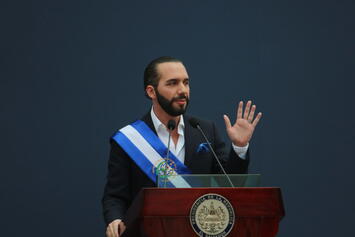
Nayib Bukele, president of El Salvador, became a media sensation after releasing videos showing him transporting gang members he’d arrested to a new prison. He essentially just rounded up everyone who was in a gang, plus others caught up in his dragnet, and locked them up - saying he was throwing away the key.
While criticized by international human rights organizations, his moves helped break the back of violent crime in the country. Once a country with one of the highest homicide rates in the world, El Salvador (pop 6.3 million) now has fewer murders than Indianapolis (pop 1 million). Bukele has a 90% approval rating and is the darling of Latin American politics.
I wrote an article earlier this year warning people not to overly praise Bukele. Virtually none of us have been to El Salvador. We don’t know what’s really going on there. I can see that Bukele deliberately uses fascist style imagery on his social media. And he appears to have circumvented the law to enable him to run for re-election. So I am not someone who is a member of Team Bukele.
Bukele used to run his family’s marketing company. And he’s very clearly a highly effective marketer. Candidly, his videos of what he is doing in El Salvador are far more well done and effective that the marketing materials of most major US cities.
So while we don’t know the reality on the ground in El Salvador, what we can do is assess how he markets himself and his programs. That’s what I want to do here. Again, this is limited to his pitch, not a judgment on what he’s actually accomplished, which I don’t have direct knowledge of.
While Bukele is most famous for his gang crackdown, what I find most interesting are his series of social media videos touting public investment in El Salvador. He is clearly very keen to portray himself as a master builder, someone improving physical infrastructure and public goods and services that benefit the people of El Salvador. His videos are subtitled in English, so he is also clearly hoping for international attention, which many of them have gotten.
In one video called “Collective Inheritance,” he lays out his philosophy of investing in public goods. He says (somewhat edited for space):
When we were in the Mayor’s Office, in San Salvador, we were talking about the renovation of the plaza. And I remember that the budget was an investment of around one million dollars. An ARENA party city councilor at that time said it was too expensive, that a plaza like that could be renovated with $100,000. I said, “Of course. You could do it with just $10,000. It’s a matter of what you are going to do with those $10,000, $100,000 or $1 million.” We want to have a first rate plaza.
So he asked for the numbers and detailed expenses…He asked, “Why are we going to install marble? Why granite? Why not just cement it and paint it?” I asked him what his kitchen countertops were made of, if they were painted cement or not. He said, “Well obviously I have better materials there.” And the question is, if that’s good enough for your family, why isn’t it good enough for the rest of Salvadorans? He said because one is private, the other is public.
I said, before, in ancient Greece and Rome, the public spaces were the best. If you look at the ruins of the homes of the nobility, there were certainly nice homes, but they were nothing compared to the luxury of the Parthenon or the Senate or the public plaza…The public spaces were the best. And one reason was because it was a collective inheritance. We all have a private inheritance. But what is our generation going to pass on for the next generation? We want the best, as if it were for our children.
This rhetoric reminds me of former Bogota mayor Enrique Peñalosa, who undertook a public improvement campaign in his city, being especially noted for his bus rapid transit system. Peñalosa, also something of an international darling, would say things like the mark of a great city is not when the poor have cars but when the rich ride public transit.
Read the rest of this piece at Aaron Renn Substack.
Aaron M. Renn is an opinion-leading urban analyst, consultant, speaker and writer on a mission to help America's cities and people thrive and find real success in the 21st century. He focuses on urban, economic development and infrastructure policy in the greater American Midwest. He also regularly contributes to and is cited by national and global media outlets, and his work has appeared in many publications, including the The Guardian, The New York Times and The Washington Post.
Photo: Gobierno Danilo Medina via Flickr under CC 2.0 License













money from somewhere
Many dictators have built elaborate public edifices.